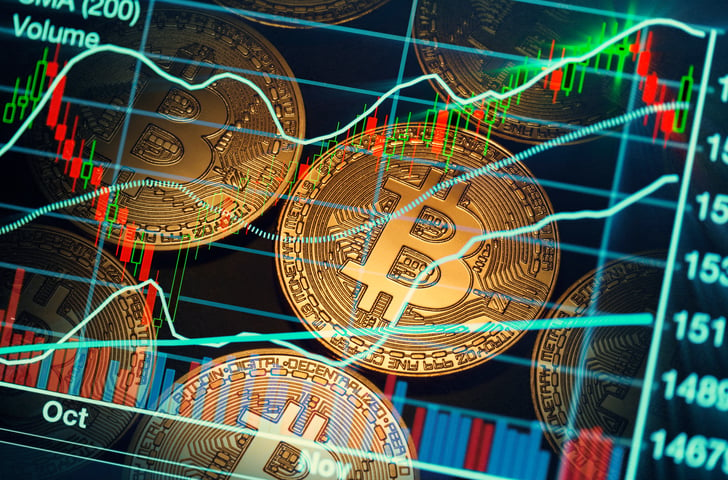Our cryptocurrency expert Sam Volkering has sent over in his reply to yesterday’s story about banks trying to prevent their customers from buying crypto. You’ll need to check it out to fully understand today’s Fortune & Freedom.
The claim that cryptocurrencies are connected to fraud is a case of the pot calling the kettle black, says Sam: “The traditional system continues to have lost far, far more to scams and fraud than crypto ever has.” It reminds me of the stories about cash being used for illegal purposes. But more on the banking system’s culpabilities in a second…
Sam also answered J.B.’s specific questions…
J.B.: Am I being unfair in my frustration? Like all walks of life, scams happen to everything. Is the bank right to protect me as a customer, despite me conducting due diligence and research?
Sam: No, I believe the basic purpose of a bank in this instance is to facilitate transactions for you. Security is part of this, but it can’t be an excuse to flatly ban transactions which you instruct the bank to undertake with your money.
J.B.: Is it overly cynical to think the bank is hiding behind a veil of “protection”, but is simply prohibiting customers to use their own money (again, fiat escaping to crypto)? It’s easy to do something when it’s dressed up as a good intention.
Sam: No, the bank’s policy is clearly a thinly veiled ban on transactions imposed to prevent access to cryptocurrencies, even for those who understand the risks and want to pursue them anyway. Your dialogue with the bank’s team makes this clear, in brilliant fashion, I might add. It also shows why the banks may be on borrowed time. They have too much power and they have overused it. Meanwhile, a system in which they have no such power – nobody does – is now on offer for users of payment systems (which is all of us). Which one will users increasingly tend towards? The system that can control their spending, or the one that can’t?
J.B.: This does not seem to me to be handled as a traditional fraud case – usually, when I buy a bag of crisps from a motorway services I’ve never been to, I get a text message. It explains that unusual activity has been spotted on your account, did you make these purchases, please reply yes or no and the card is unfrozen. What I’ve experienced here seems to be a specific trap where customers can’t get out of and are presented with a completely opaque policy – the perpetual loop of “try it again till you give up”!
Sam: Yes, it’s a deliberate game which only has one outcome, no matter how you play it. So why have a game at all? Why are they making you jump through hoops with no chance of success? In the hope of disguising what’s really going on, that’s why.
J.B.: Do we think the bank’s policy makers have done this on purpose or is this just a case of incompetence with something they don’t understand?
Sam: Both. They are beginning to understand the nature of the threat. When there was no real alternative to the banking system, incompetence was a tool and weapon for the banking industry to use. But this time, there is an alternative, and so it won’t work any more. It just drives more people to use crypto. And that’s what the banks haven’t yet understood. It’s the failures of the banking system which makes crypto so attractive.
J.B.: Clearly the representatives in the fraud team see crypto as dirty and “scam only” – is this a direct result of the bank’s policy makers or just a lack of education?
Sam: The fact that it’s a bank policy is clear from your quotes of their policies. I’m not sure if it’s a lack of education or not – if they understood the threat which crypto poses, trying to prevent people from leaving the legacy financial system is just what they’d do anyway.
J.B.: If (all) payments to exchanges are seen as “fraud”, who is specifically being accused of fraud? Is it the customer? If so, what are the long-term repercussions to this? Do I get a black-spot against my name? Is my credit rating damaged? Or is the bank accusing the exchange of fraud?
Sam: They’re accusing all crypto exchanges of inherently being frauds. Perhaps they should take an introspective look at their own organisations. “NatWest faces criminal case over money laundering,” “HSBC moved Ponzi scheme millions despite warning,” “UK bank shares have taken a hit after some of the world’s largest lenders were accused of allowing criminals to launder dirty money, leaked documents allege” and so on and so forth.
J.B.: This is a worrying slippery-slope of arbitrary policy… Where does it end? Will I be able to buy a second-hand diesel vehicle in 10 years’ time or will that be against the bank’s ‘climate responsibility strategy’. The unintended consequences of this allow a foothold of more pernicious policies to gain traction!
Sam: Exactly right. But then amplify it with the potential development of central bank digital currencies (CBDCs) – Britcoin and others. We think X is a dirty organisation, so you can’t spend your Britcoin there. Control of money is the ultimate weapon. Some people hope that it’ll be used in “good” ways. Others fear “bad”. Either way, the point is that the level of control is higher. But cryptocurrencies solve this problem too. They give the power to users of the money, not institutions.
Sam also offered up some solutions to the problems J.B. experienced:
- Switch banks. There are some that have fraud protection triggers in place, but once passed, allow transfers/payments. It’s tricky to know which ones allow it and which don’t. I’ve not had any issues with the bank I use, for example, but then again I’ve heard some people have had problems with them.
- Try other exchanges: Coinbase, Gemini, Mode (bitcoin only at this point), Kraken, Huobi, or Bitpanda. They may block one and not others. Also, some, like Mode and Bottlepay for instance, connect directly with open banking in the UK. This should make them fine to use as you transfer in the GBP and then make the transactions. I’ve not had issues with either to this point.
- Further restriction like this will end up making bitcoin how it used to be – peer to peer transactions, markets which connect peers to each other for exchanges rather than to intermediaries. I expect to see more of this in the coming couple of years – truly decentralised exchange. In the old days you could arrange to meet someone in person, give them the money and then transfer the bitcoin. It’s a bit more onerous, but it still happens and will likely happen more if there’s suppression from the banks. You can see Nigeria as a prime example of what happens when restrictions and bans just drive it all underground.
I hope that that helps, J.B. and others. Both to understand what’s going on and how to fight back.
As I see it, we have had something akin to a modern-day bank run – with cash flowing out of bank accounts and into crypto. The banks are turning to time-honoured ways of slowing it down.
In the end, I’m not sure that the banks will win.
This is all part of Sam Volkering’s prediction for what happens next to the bitcoin price as adoption only grows. Find out more here.

Nick Hubble
Editor, Fortune & Freedom




